The 5th Jeju 4·3 Peace Awards Ceremony
A stepping stone and milestone for resolving Jeju 4·3
Editing Office
Commemorative Project Team, Jeju 4·3 Peace Foundation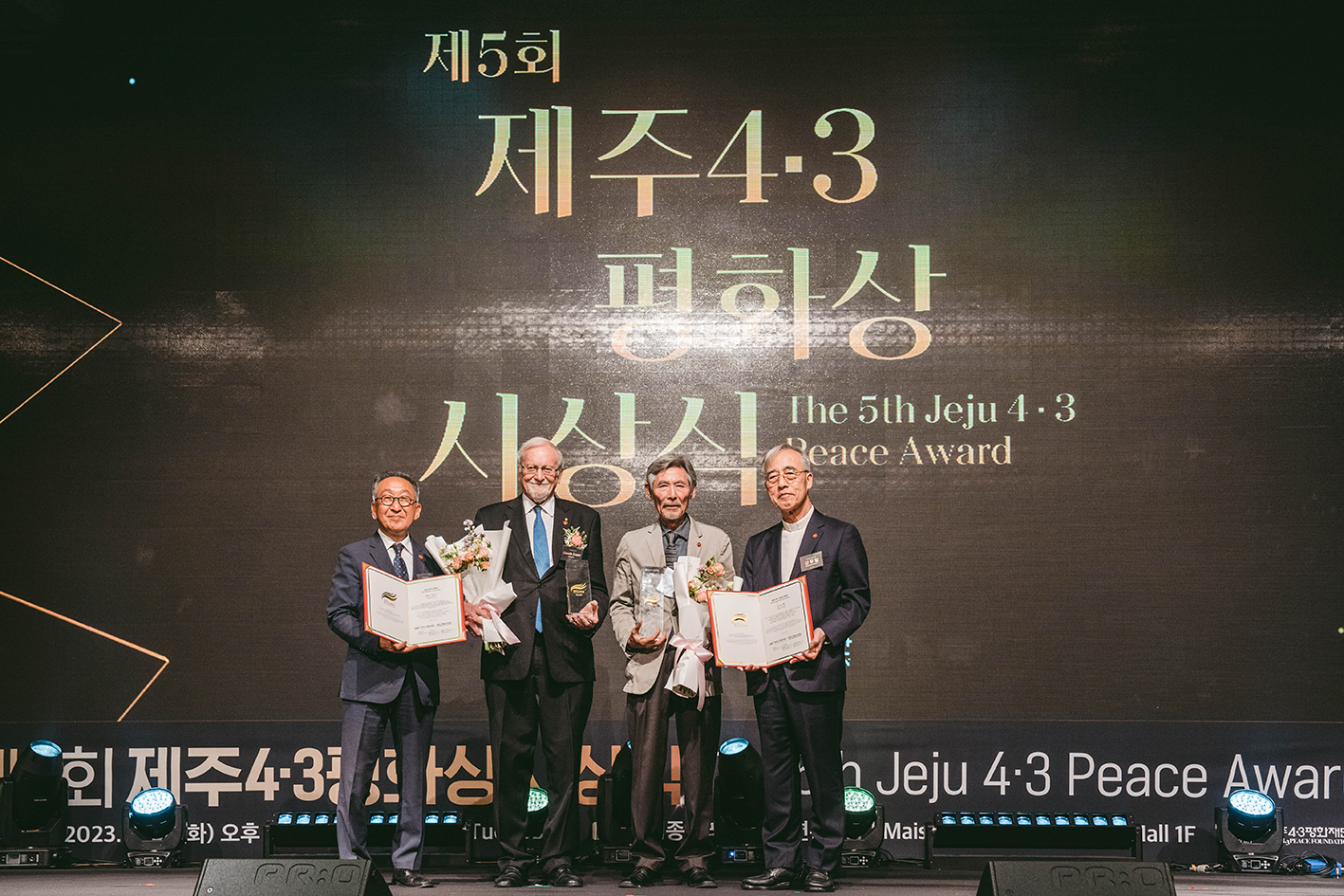
+++ (From left) Koh Hee-bum, president of the Jeju 4·3 Peace Foundation, Gareth Evans, winner of the Jeju 4·3 Peace Prize, Kang Yo-bae, winner of the Jeju 4·3 Peace Special Prize, and Kang U-il, chairperson of the Jeju 4·3 Peace Awards Committee
 +++ The winners hold a joint conference prior to the award ceremony.
+++ The winners hold a joint conference prior to the award ceremony.
Peace Prize presented to Gareth Evans, Special Prize to Kang Yo-bae
The Jeju 4·3 Peace Foundation and the Jeju 4·3 Peace Awards Committee (Chairperson: Bishop Peter Kang U-il) held the 5th Jeju 4·3 Peace Awards Ceremony on May 30 at Maison GLAD Jeju.
Of the awards, the Jeju 4·3 Peace Prize was presented to Prof. Gareth Evans (78), former Australian foreign minister and a longtime advocate for international peace and human rights. Painter Kang Yo-bae (71) won the Jeju 4·3 Special Prize for contributing to the investigation of the tragic event that swept through Jeju seven decades ago by vividly recreating historical scenes in his works.
The award ceremony was attended by representative political figures, including Oh Young-hun, governor of the Jeju Special Self-Governing Province, Kim Kyung-hak, chairperson of the Jeju Special Self-Governing Provincial Council, and Kim Kwang-soo, superintendent of the Jeju Special Self-Governing Provincial Office of Education.
The attendees also featured some 150 guests, featuring past award winners and members of relevant political, civic, and arts groups, such as the Jeju 4·3 Peace Awards Committee and its working committee, the national Jeju 4·3 Committee and its working committee and the Jeju Special Self-Governing Provincial Council as well as Jeju 4·3-related organizations, including the Association of Bereaved Families of Jeju 4·3. Scholars from the United States attended the event, including Sung-Yoon Lee, a professor at Tufts University, Alexis Dudden, a professor at the University of Connecticut, and Jean H. Lee, a public policy fellow at the Woodrow Wilson Center.
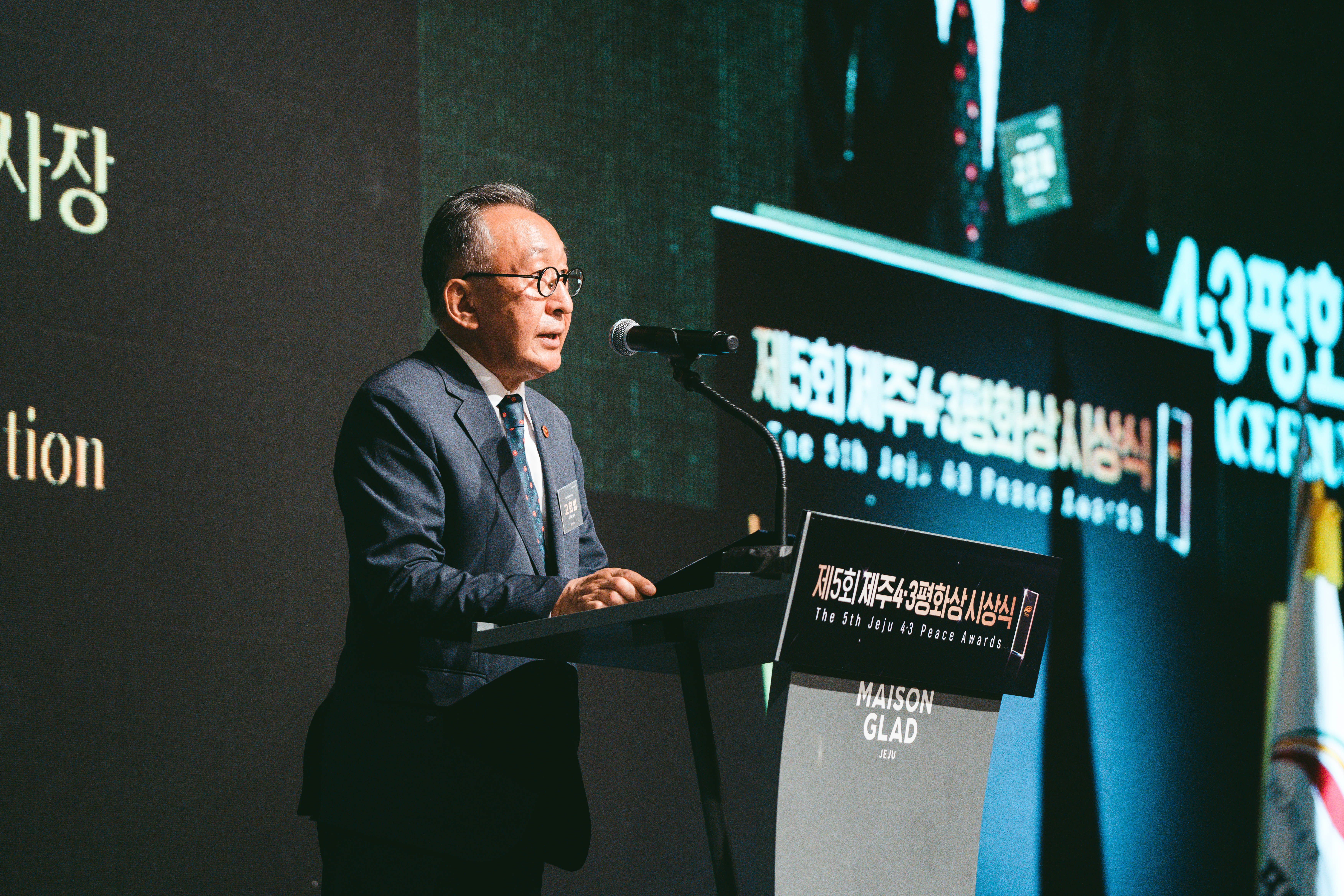
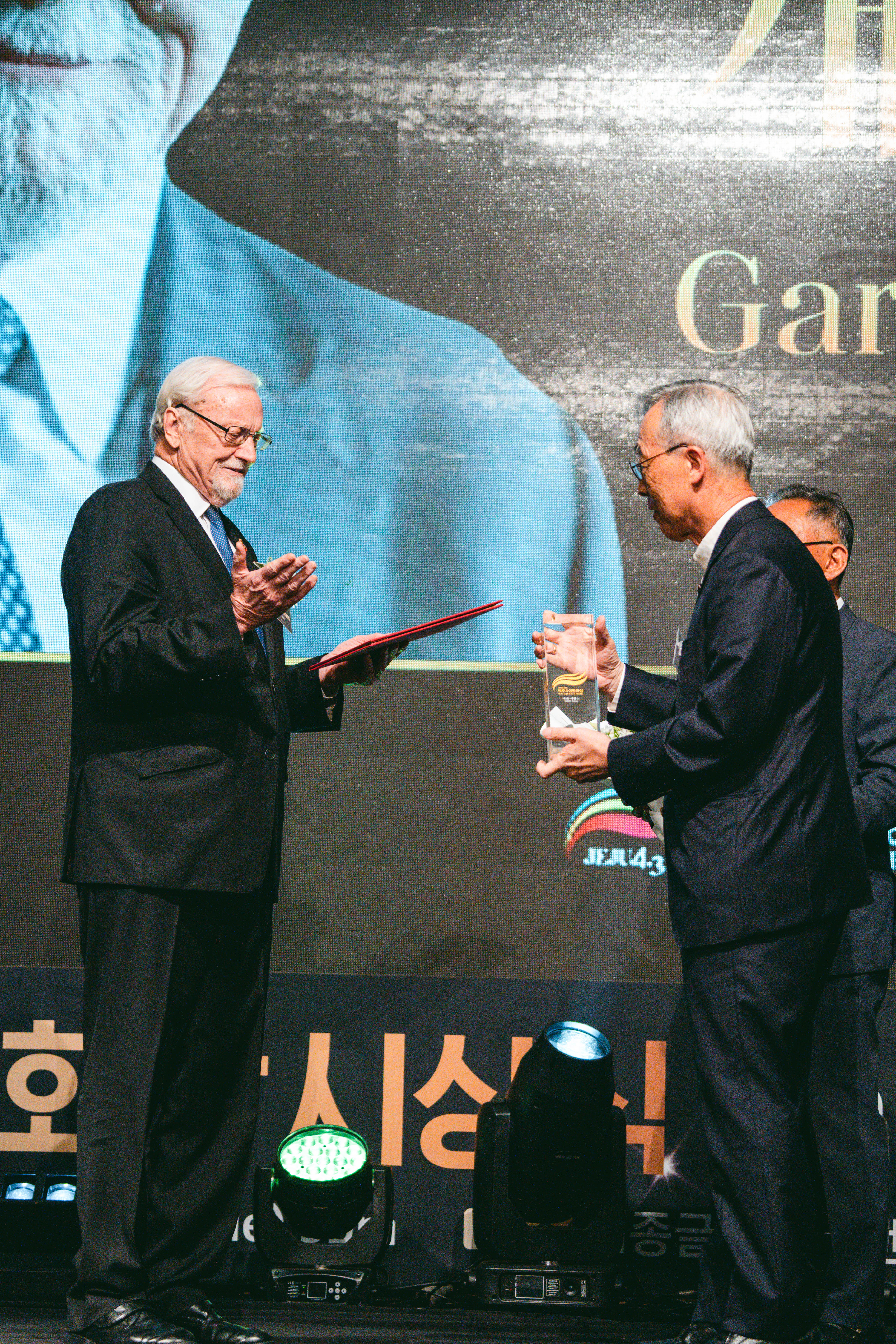
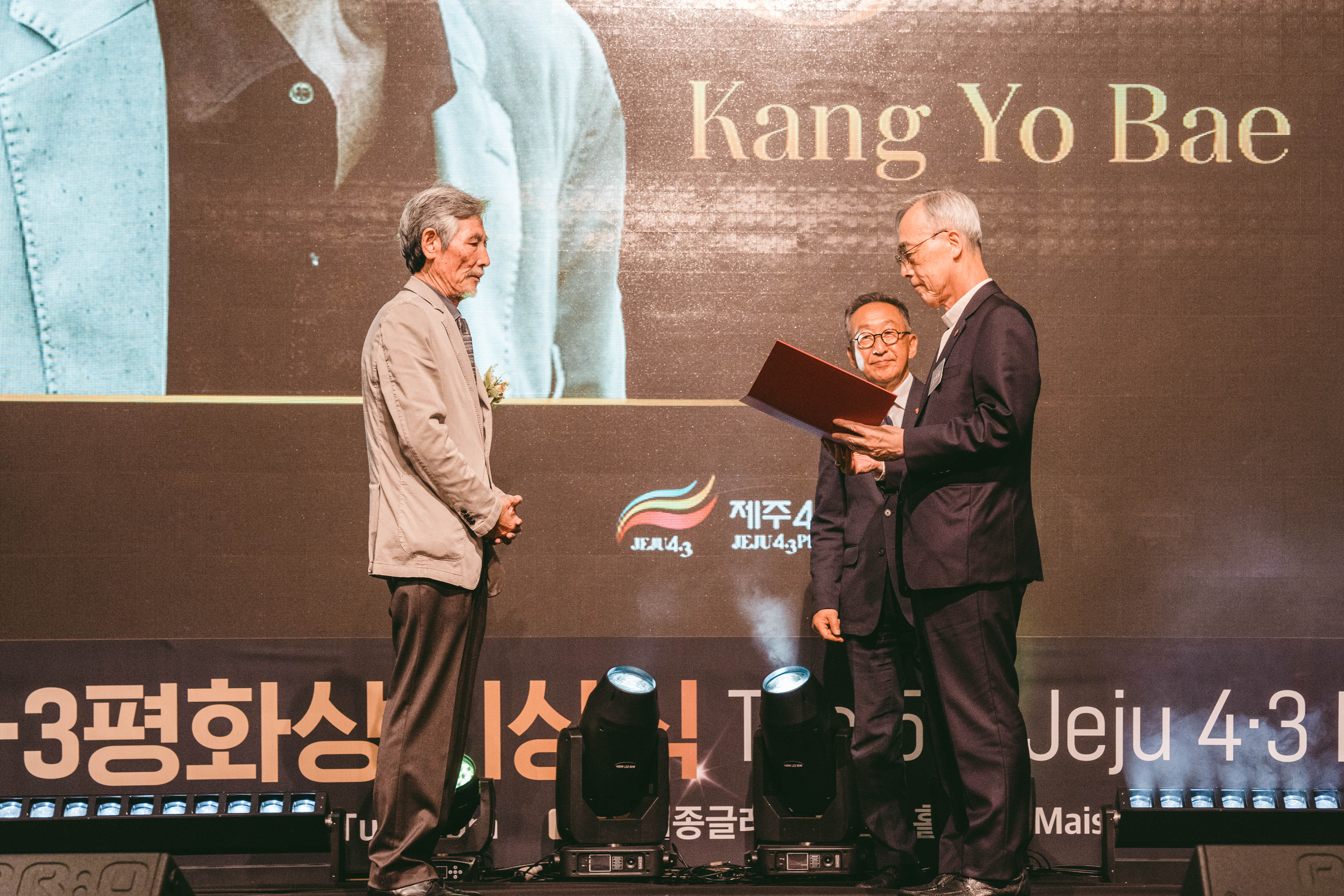 +++ An opening speech by Koh Hee-bum; the awarding of the Jeju 4·3 Peace Prize (Gareth Evans) and the Jeju 4·3 Peace Special Prize (Kang Yo-bae) by Kang U-il.
+++ An opening speech by Koh Hee-bum; the awarding of the Jeju 4·3 Peace Prize (Gareth Evans) and the Jeju 4·3 Peace Special Prize (Kang Yo-bae) by Kang U-il.
Koh Hee-bum, president of the Jeju 4·3 Peace Foundation, showed appreciation for the timing of this year’s awards in his opening speech, stating the accolades were being presented to those who have devoted themselves to promoting peace, human rights, democracy, and social cohesion at a time when the importance of peace and human rights is felt more acutely than ever.
The Jeju-born activist also recognized that presenting the prizes to Prof. Evans and Mr. Kang represent a stepping stone and a milestone in the Jeju 4·3 movement that pursues peace, human rights, reconciliation, and mutual prosperity through a just resolution of Jeju 4·3. Koh concluded his speech by anticipating that the winners of the 5th Jeju 4·3 Peace Awards will make even greater achievements in raising awareness of Jeju 4·3 on a global stage and take the lead in fostering worldwide solidarity and cooperation to enhance universal values for humanity.
The opening speech was followed by remarks from Bishop Peter Kang U-il, the chairperson of the Jeju 4·3 Peace Awards Committee. The respected Catholic priest stated that the people of Jeju have honored the victims of Jeju 4·3 and have examined the implications and values of the tragic event for more than 70 years. In presenting the Jeju 4·3 Peace Awards, he paid tribute to those who share lessons learned from history and testify to it with words and actions.
Prof. Evans, the winner of the 5th Jeju 4·3 Peace Prize, has devoted himself to peace and human rights in Australia as well as in international and non-governmental organizations as a professor, politician, diplomat, and activist.
In his acceptance speech, Prof. Evans said he was honored to receive the 5th Jeju 4·3 Peace Prize, and was both gratified and humbled by what was said in the citation about his efforts many years, although he feared with many more failures and success, to make this troubled world of ours safer, saner, more equitable and just.
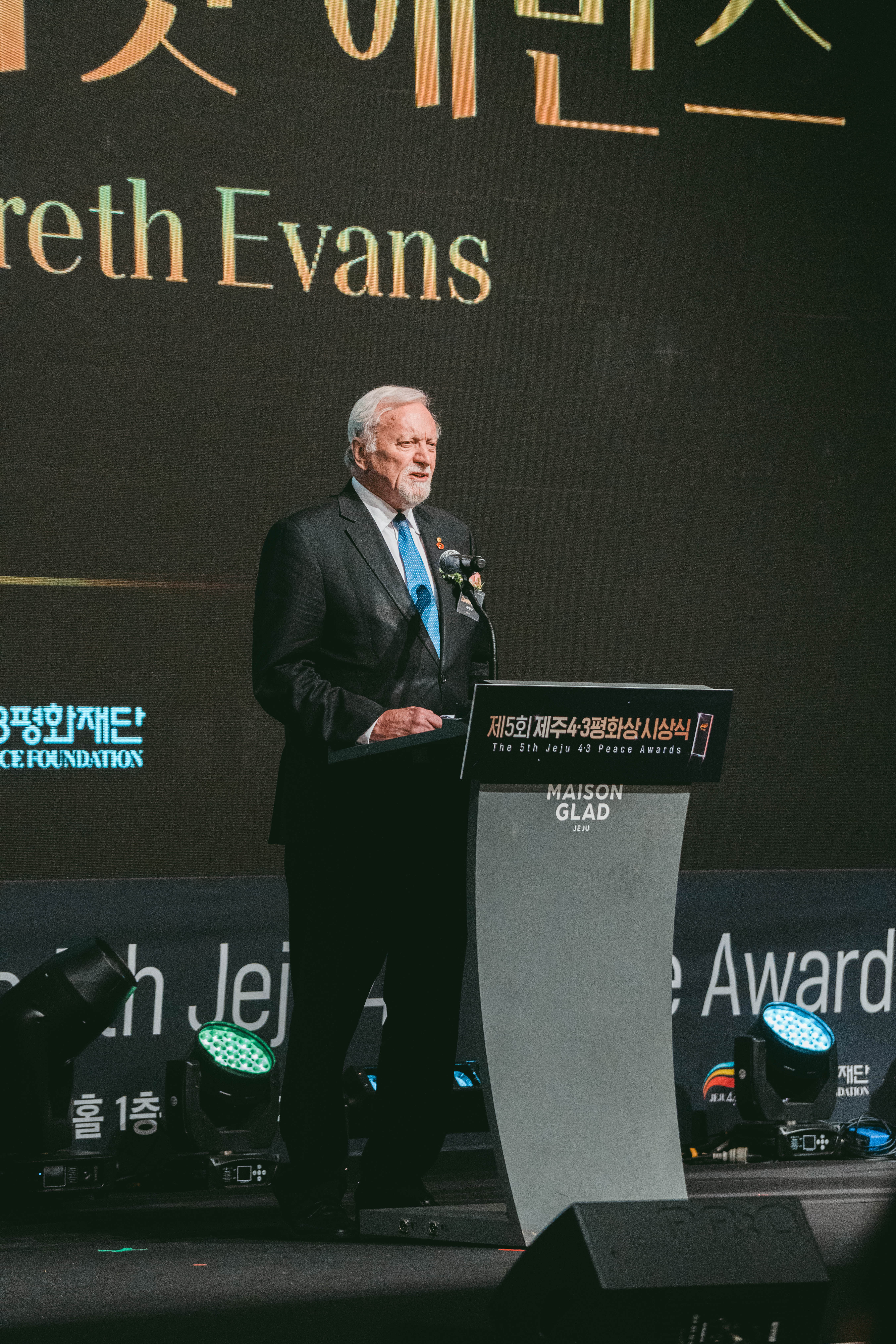
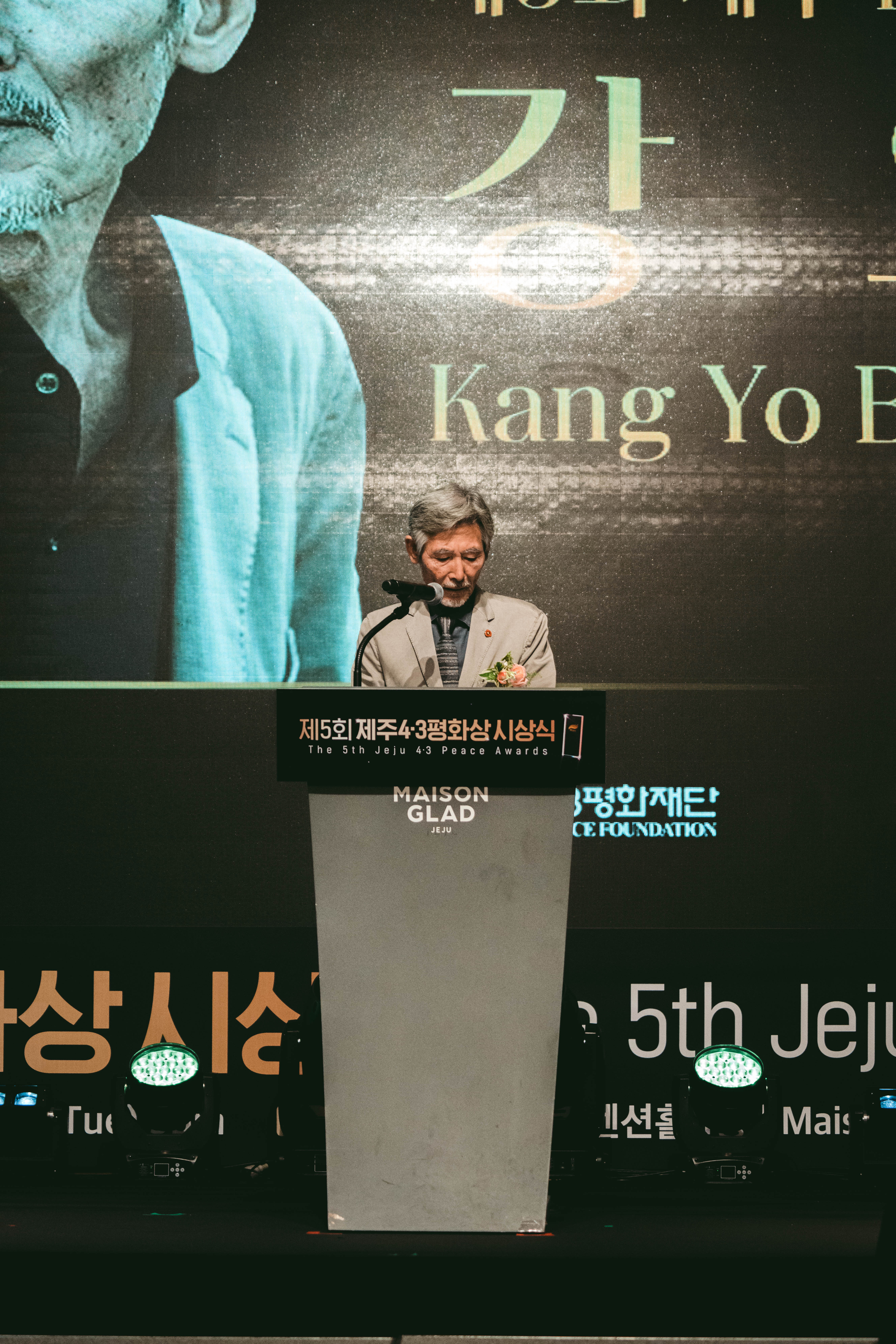 +++ The winners share their thoughts on the award.
+++ The winners share their thoughts on the award.
Citing philosopher George Santayana’s famed statement that those who cannot remember the past are condemned to repeat it, Prof. Evans said that what is most meaningful to him about this award is that it honors and commemorates the memory of all those who died. He also ensured that the award and all the other accompanying work of the Jeju 4·3 Peace Foundation on peace and reconciliation will keep that memory alive and that the message will be much more widely communicated and understood.
Finally, he expressed his determination to sustain and energize his own work for peace, particularly to achieve global acceptance and traction for the concept of “the responsibility to protect” populations against genocide, other major crimes against humanity and war crimes – atrocities of the kind committed on Jeju.
Kang, the recipient of the 5th Jeju 4·3 Peace Special Prize, fueled the nationwide movement to enact the Jeju 4·3 Special Act by revealing in his famed 1992 art series on Jeju 4·3 the resistance and tragedy of the Jeju people. The painter’s representative pieces Camellias Fall helped achieve national recognition of Jeju 4·3 as the flower became a symbol of the tragic history and the subsequent truth-finding movement. The artist is considered a pioneer who led Jeju 4·3 art movement by continuously dealing with the history of Jeju 4·3 in his work.
 +++ A commemorative photo taken after the award ceremony.
+++ A commemorative photo taken after the award ceremony.
In his acceptance speech, Kang said he is honored and pleased to receive more than he deserves.
“Humbly speaking, it was a process of trying to control myself in a state of mental and physical despair,” he said, referring to his years of creating works on Jeju 4·3. As he puts it, it was also the process of finding out that the root of modern Korean society in this era is the history of Jeju, his hometown. The painter also shared his creed with the audience that like a giant tree with many hundreds of growth rings, an individual or society can live firmly in the present only after embedding history well.
“I believe that the history of Jeju 4·3 becomes a lesson and transformed to wisdom in life, and that it finally becomes a holy power that will make everyone strong and allow them to bloom magnificently,” he asserted.
The Jeju 4·3 Peace Foundation awarded a plaque and a certificate to the winners, with an additional cash prize of 50,000 USD and 10,000 USD for the Jeju 4·3 Peace Prize and the Jeju 4·3 Peace Special Prize, respectively.
 +++ Kang Yo-bae, the winner of the Jeju 4·3 Peace Special Prize, is with Jeju 4·3 activists and artists.
+++ Kang Yo-bae, the winner of the Jeju 4·3 Peace Special Prize, is with Jeju 4·3 activists and artists.
Bringing global attention to Jeju 4·3: Saving the future by remembering the past
Prior to the award ceremony, a joint press conference was held with the winners, who shared their activities and achievements, as well as their feelings and thoughts on receiving the prizes.
According to Prof. Evans, it is unfortunate that Jeju 4·3 is little known internationally although it is an event that should be remembered. Prof. Evans added that in this sense, it is an honor for him to share the spirit of Jeju 4·3 by receiving the prize. The globally renowned activist also said that after the crisis has passed, what to do afterwards remains to be a challenge. “It is important to crystalize the concept so that the world can understand Jeju 4·3,” he stressed. He pointed out that a positive attitude is the key to inheriting and promoting the spirit of Jeju 4·3, appreciating that the activities, research, and awards conducted and presented by the Jeju 4·3 Peace Foundation will play a vital role in it.
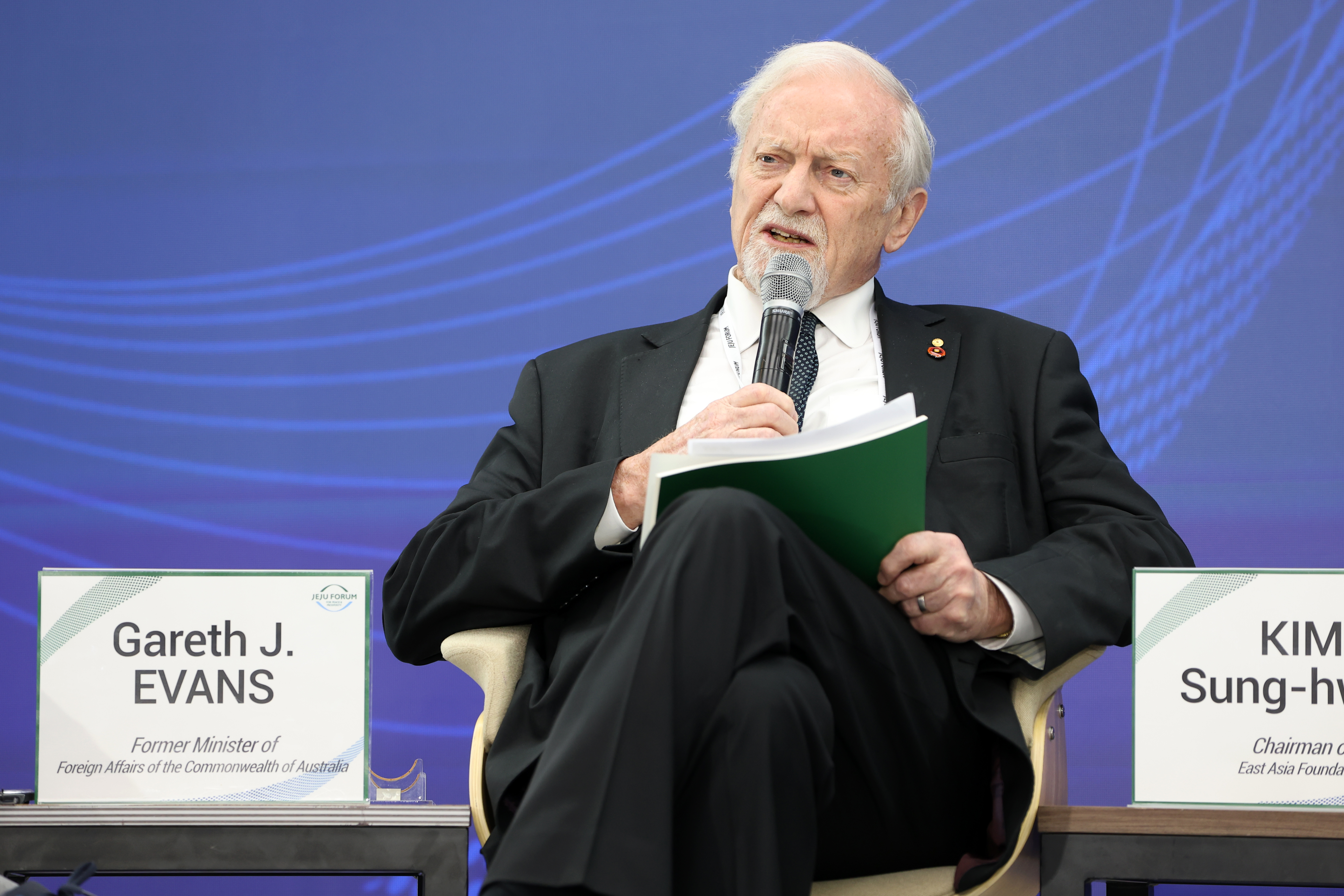
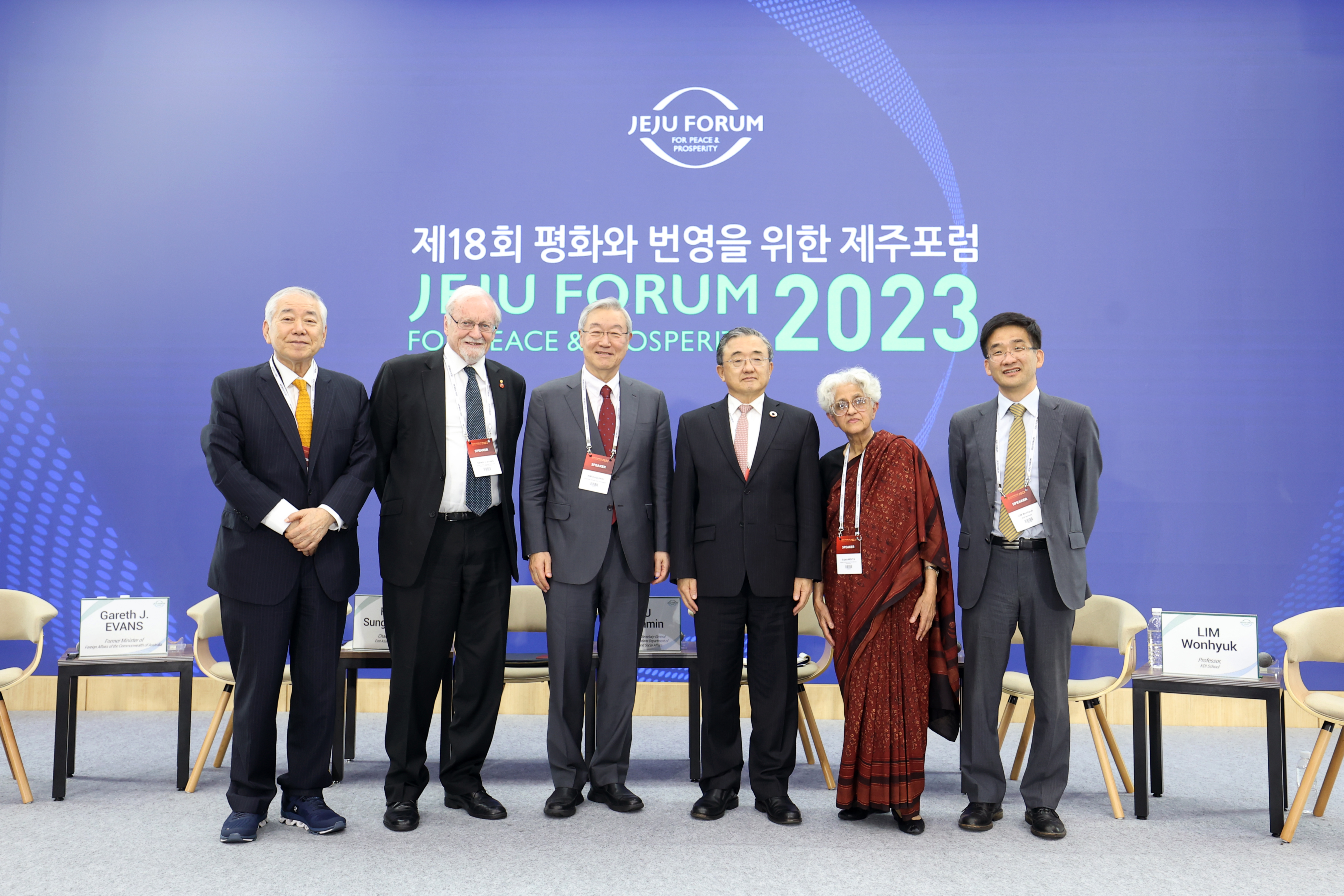 +++ Gareth Evans speaks at the Jeju Forum for Peace and Prosperity (top); group participants of the Jeju Forum, which was held under the theme of “Working Together for Sustainable Peace and Prosperity in the Indo-Pacific” (bottom).
+++ Gareth Evans speaks at the Jeju Forum for Peace and Prosperity (top); group participants of the Jeju Forum, which was held under the theme of “Working Together for Sustainable Peace and Prosperity in the Indo-Pacific” (bottom).
Referring to Jeju 4·3 art, Kang admitted that the process of visualizing and sensitizing history is bound to bear the risk of excess and distortion to some extent. “As this has always kept me worried in the face of the severity of history, it is necessary to vividly recall the actual scenes at the time of Jeju 4·3 through novels, testimonies, and stories told by those who experienced it firsthand,” he advised.
The day after the award ceremony, the laureates visited the Jeju 4·3 Peace Park and honored the spirits of the victims at the Memorial Altar.
Additionally, Evans attended the 18th Jeju Forum for Peace and Prosperity held at the International Convention Center Jeju and had a talk with Gov. Oh in the forum’s closing Session “Promoting the Culture of Peace and the Role of Sub-national Actors,” which was organized by the Jeju Peace Institute. During the talk, he emphasized that the value of Jeju 4·3 should be recognized globally, as is the natural beauty of Jeju Island. Urging the U.S. government to admit to its role in Jeju 4·3, just as the South Korean government did, he clarified that acknowledging and accepting wrongdoings will lead to reconciliation in a true sense.
The Jeju 4·3 Peace Awards was established in 2014 by the Jeju 4·3 Peace Foundation to share with the world the peace-seeking attitude of the Jeju people who have justly resolved Jeju 4·3, one of the most atrocious and gigantic genocidal events in contemporary Korean history, by pursuing reconciliation and mutual prosperity. Since its inauguration in 2015, the Jeju 4·3 Peace Awards has announced its winners biennially. For the awards, the Jeju 4·3 Peace Foundation forms the Jeju 4·3 Peace Awards Committee and its related working committee. The committees screen the contributions of individual or group candidates to the resolution of Jeju 4·3 or the promotion of peace of humanity, human rights, democratic progress, and social integration.
The past winners are as follows:
▲ The 2Jeju Peace Awards: Jeju 4·3 Peace Prize – Kim Sok-pom; Jeju 4·3 Peace Special Prize – Muhammad Imam Aziz
▲ The 2nd Jeju 4·3 Peace Awards: Jeju 4·3 Peace Prize – Bruce Cumings
▲ The 3rd Jeju 4·3 Peace Awards: Jeju 4·3 Peace Prize – Hyun Ki-young; Jeju 4·3 Peace Special Prize – Nguyen Thi Thanh (from Hà My village) and Nguyen Thi Thanh (from Phong Nhi and Phong Nhất villages)
▲ The 4th Peace Awards: Jeju 4·3 Peace Prize – Dan Smith; Jeju 4·3 Peace Special Prize – Jeju 4·3 Mount Halla Association